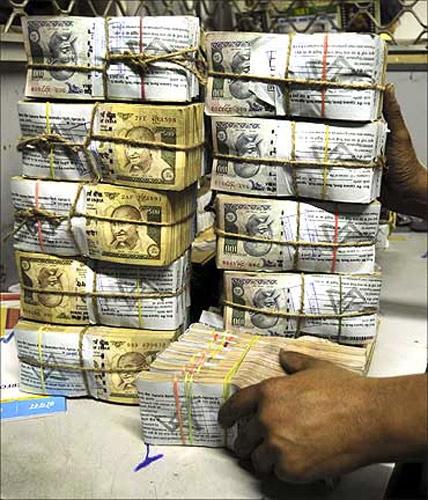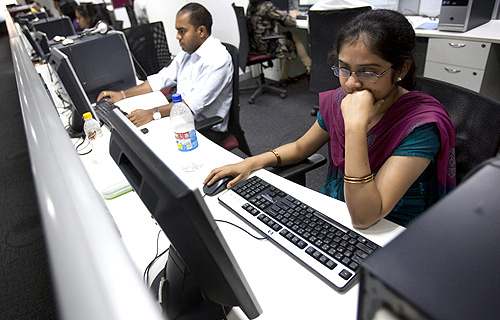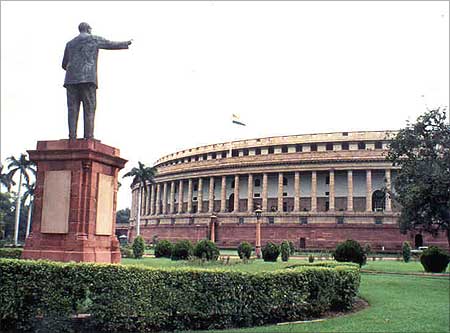 | « Back to article | Print this article |
How to make India a better place for business
India lags the world in attracting investment, because the country is seen as unfriendly to business, writes Jaimini Bhagwati
It is de rigueur nowadays to advocate the lowering of barriers to entry to promote competition.
In the Indian context, it is a routine lament that several sectors are reserved for government-owned institutions or dominated by public sector firms -- for example, atomic energy, defence, conventional energy (coal, oil and gas, and hydro-power) and banking.
Abstracting from this perceived lack of competition due to government and public sector dominance in some sectors, this article focuses on the constraints in doing business in India.
Click NEXT to read further. . .
How to make India a better place for business
The article also suggests ways to improve the enabling environment for business, particularly since India is seen as lagging competitor countries in attracting foreign direct investment.
It appears from anecdotal evidence that a few established Indian companies are being driven by the difficulty of doing business in India to invest marginally more elsewhere around the world.
Some top Indian CEOs emphasise in private conversation that they are concerned about uncertainties, particularly in matters related to the sanctity of contracts, land acquisition, environmental clearances and management-labour relations.
Click NEXT to read further. . .
How to make India a better place for business
It is very likely that part of this is self-serving.
However, there has been a surge in the number of prominent Indian businesspersons setting up permanent or near-permanent alternate residences outside India.
It is also true that larger and well-established firms have the resources to be able to work around difficulties, including infrastructure shortcomings, but small and medium enterprises and start-ups do not.
The latest Union Budget, which was presented on February 28, 2013, had to necessarily focus on fiscal consolidation.
Click NEXT to read further. . .
How to make India a better place for business
Consequently, the government will have limited resources in the next 12 to 18 months to support employment generating infrastructure projects or SMEs.
It follows that it is even more necessary for India to be seen as business-friendly to boost private and multilateral investment.
Another crucial objective, namely higher levels of employment generation, would progress faster if there is greater co-ordination across various arms of the government.
At an overall level, central government line ministries and regulatory bodies have to be accountable for doing their bit to help achieve this Budget's projections.
Click NEXT to read further. . .
How to make India a better place for business
Additionally, we need to facilitate the entry of new business by easing barriers to entry.
Further, it is necessary to reduce the variability of the interpretations of our tax codes since this is a cause for concern domestically and internationally.
All this has to be uncontroversial and even trite.
Thinking along, as concerned Indians we need to ask what can be done in the short term, which does not require legislative approval to enhance investment.
Specifically, on the difficulties of doing business in India, the World Bank's cross-country report is a useful starting point.
Click NEXT to read further. . .
How to make India a better place for business
The World Bank ranked India at a lowly 132nd position out of 185 countries in 2013; the same rank was assigned to India in 2012.
India's rankings, broken down by business indicators, are listed in the table.
These low Indian rankings in the World Bank's evaluation invariably draw critical commentaries.
And then nothing more is heard till the next report is issued.
Such cross-country comparisons are limited in accuracy and robustness since the business conditions that exist on statute and rule books are part of the story; ground realities can be substantially different.
Click NEXT to read further. . .
How to make India a better place for business
Even surveys based on opinion polls among entrepreneurs, businesspersons and others can be misleading when compared across countries.
In contrast, the changes in the rankings of the same country over time are likely to be somewhat more reliable.
To misuse Donald Rumsfeld's expression, the known unknowns and perhaps some of the unknown unknowns for the same country are similar over time.
Although cross-country comparisons are fraught with complications and we may not quite agree with the World Bank's findings, it does not appear that systematic surveys about doing business in India have been carried out by India-based institutions.
Click NEXT to read further. . .
How to make India a better place for business
The latest Economic Survey, issued on February 27, 2013, refers to the World Bank's cross-country rankings on doing business rather than an in-house study (pages 37-38).
Irrespective of the accuracy of the business indicator rankings in the table, it should be worrisome that India is listed as far down as 184th in enforcement of contracts, 182nd in dealing with construction permits and 173rd in starting a business.
It is a competitive world in terms of attracting investment, and so such perceptions do not help.
Click NEXT to read further. . .
How to make India a better place for business
Consequently, instead of fulminating we need to dig deep to identify ways to overcome or get around political economy factors to improve the environment for doing business in India.
Concurrently, we need to develop our own parameters and indices that track progress on doing business on a sector specific basis.
Business Standard sponsors awards for corporate excellence.
It would be equally, if not even more, useful towards facilitating business if Business Standard or another publication were to set up annual awards for central or state government departments and regulators.
Click NEXT to read further. . .
How to make India a better place for business
The recognition could go to those who have done the most to facilitate the setting up of new businesses and to help them consolidate.
If one publication's resources are limited and there is a need for plausible deniability against accusations of subjectivity, industry associations could be associated to make the evaluation process broader and contribute to the funding for such awards.
To conclude, there are no silver bullets to clear obstacles and improve the environment for doing business in India.
At the apex level, the government has taken the welcome step of setting up the Cabinet Committee on Investment, which held its first meeting on January 30, 2013.
Click NEXT to read further. . .
How to make India a better place for business
At an official level, we already have the committee of secretaries headed by the Cabinet secretary.
The CoS could follow up on the Cabinet Committee on Investment's decisions to push timely implementation.
However, it would be more effective if separate sub-groups of not more three secretaries were to be empowered to implement each decision by the Cabinet Committee on Investment.
These groups of officials could consult with designated financial sector and think tank sector specialists in a time-bound manner.
This should be an improvement over existing oversight mechanisms for project implementation.
The writer is India's High Commissioner to the UK. Views expressed are personal.











